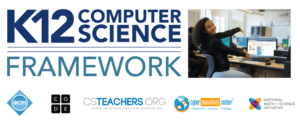Computer science and the technologies it enables rest at the heart of our economy and the way we live our lives. To become well-educated citizens in a computing-intensive world, and to prepare for careers in the 21st century, our students must have a clear understanding of the principles and practices of computer science.
The CSTA K–12 Computer Science Standards delineate a core set of learning objectives designed to provide the foundation for a complete computer science curriculum and its implementation at the K–12 level.
The Standards, last published in 2017, were designed by educators to be coherent and comprehensible to teachers, administrators, and policymakers, in order to:
- Introduce the fundamental concepts of computer science to all students, beginning at the elementary school level
- Present secondary school computer science in a way that can fulfill a computer science, math, or science graduation credit
- Encourage schools to offer additional secondary-level computer science courses that will allow interested students to study facets of computer science in more depth and prepare them for entry into college or the workforce
- Increase the availability of rigorous computer science course offerings for all students, especially those who are members of underrepresented groups
Levels 1A, 1B, 2, and 3A are the computer science standards for all students. Level 3B is intended for high school students who wish to pursue the study of computer science beyond what is required for all students (i.e., in specialty or elective courses).
Connection to the K–12 CS Framework

The K–12 Computer Science Framework provides overarching, high-level guidance by grade band, while the standards provide detailed, measurable student performance expectations. The Framework was considered as a primary input for the Standards development process.
The CSTA Standards Revision Task Force crafted the Standards by combining concept statements and practices from the Framework. It also used descriptive material from the Framework when writing examples and clarifying statements to accompany the Standards.
Concepts
- Computing Systems
- Networks and the Internet
- Data and Analysis
- Algorithms and Programming
- Impacts of Computing
Practices
- Fostering an Inclusive Computing Culture
- Collaborating around Computing
- Recognizing and Defining Computational Problems
- Developing and Using Abstractions
- Creating Computational Artifacts
- Testing and Refining Computational Artifacts
- Communicating about Computing
License & Attribution

These Standards are licensed under the Creative Commons Attribution-NonCommercial-ShareAlike 4.0 International License (CC BY-NC-SA 4.0). Accordingly, individuals and organizations are free to share and adapt the materials in whole or in part, as long as they provide proper attribution, do not use for commercial purposes, and share contributions or derivations under the same license.
Suggested citation: Computer Science Teachers Association (2017). CSTA K–12 Computer Science Standards, Revised 2017. Retrieved from https://csteachers.org/k12standards/.
Reach out to licensing@csteachers.org for any questions about using the CSTA Standards.
